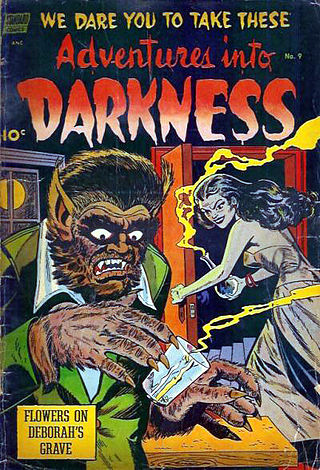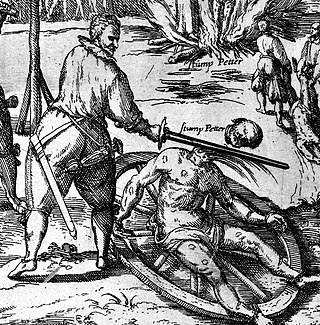
Michael John Moorcock is an English writer, best-known for science fiction and fantasy, who has published a number of well-received literary novels as well as comic thrillers, graphic novels and non-fiction. He has worked as an editor and is also a successful musician. He is best known for his novels about the character Elric of Melniboné, a seminal influence on the field of fantasy since the 1960s and '70s.

In folklore, a werewolf, or occasionally lycanthrope, is an individual that can shapeshift into a wolf, either purposely or after being placed under a curse or affliction with the transformations occurring on the night of a full moon. Early sources for belief in this ability or affliction, called lycanthropy, are Petronius (27–66) and Gervase of Tilbury (1150–1228).

Werewolf fiction denotes the portrayal of werewolves and other shapeshifting therianthropes, in the media of literature, drama, film, games and music. Werewolf literature includes folklore, legend, saga, fairy tales, Gothic and horror fiction, fantasy fiction and poetry. Such stories may be supernatural, symbolic or allegorical. A classic American cinematic example of the theme is The Wolf Man (1941) which in later films joins with the Frankenstein Monster and Count Dracula as one of the three famous icons of modern day horror. However, werewolf fiction is an exceptionally diverse genre, with ancient folkloric roots and manifold modern re-interpretations.
Time of Judgment is a series of roleplaying game scenario books for the World of Darkness settings of White Wolf Game Studio. These scenarios are presented as the semi-canonical endings of the original World of Darkness, as preparation for the new version of the setting. As the Time of Judgment approaches, vampires cease to exist, werewolves fight their last battle against the Wyrm, and mages face their last test.

William McIlvanney was a Scottish novelist, short story writer, and poet. He was known as Gus by friends and acquaintances. McIlvanney was a champion of gritty yet poetic literature; his works Laidlaw, The Papers of Tony Veitch, and Walking Wounded are all known for their portrayal of Glasgow in the 1970s. He is regarded as "the father of Tartan Noir" and as Scotland's Camus.

The Beast of Gévaudan is the historic name associated with a man-eating animal or animals that terrorised the former province of Gévaudan, in the Margeride Mountains of south-central France between 1764 and 1767. The attacks, which covered an area spanning 90 by 80 kilometres, were said to have been committed by one or more beasts with formidable teeth and immense tails, according to contemporary eyewitnesses. Most descriptions from the period identify the beast as a striped hyena, wolf, dog, or wolf-dog hybrid.

Peter Stumpp was a German farmer and alleged serial killer, accused of werewolfery, witchcraft and cannibalism. He was known as 'the Werewolf of Bedburg'.
Martin Millar is a Scottish writer from Glasgow, now resident in London. He also writes the Thraxas series of fantasy novels under the pseudonym Martin Scott.
Allan Johnstone Massie is a Scottish journalist, columnist, sports writer and novelist. He is a Fellow of the Royal Society of Literature. He has lived in the Scottish Borders for the last 25 years, and now lives in Selkirk.

The Werewolf of Fever Swamp is the fourteenth book in the original Goosebumps, the series of children's horror fiction novellas created and authored by R. L. Stine. The story follows Grady Tucker, who moves into a new house next to the Fever Swamp with his family. After a swamp deer is killed, his father believes Grady's dog is responsible, but Grady is convinced a werewolf is the culprit.

Blazin' Fiddles are a contemporary Scottish fiddle band from the Highlands and Islands. They formed in 1998 to showcase Scotland's distinct regional fiddle styles. The band have a number of awards, including; the MG ALBA Scots Trad Music Awards Live Act of the Year, Album of the Year and Folk Band of the Year. Their records are released on their own indie Blazin' Records label. They have been described as "...the LED Zepplin of the Folk World."
Shena Mackay FRSL is a Scottish novelist born in Edinburgh. She was shortlisted for the Booker Prize for Fiction in 1996 for The Orchard on Fire, and was shortlisted for the Whitbread Prize and the Orange Prize for Fiction in 2003 for Heligoland.

Carole Morin is a Glasgow-born novelist who lives in Soho, London. She has had five novels published: Lampshades, Penniless in Park Lane, Dead Glamorous, Spying on Strange Men and Fleshworld.

Early One Morning is a 2015 novel by Virginia Baily.

Troubled Blood is the fifth novel in the Cormoran Strike series, written by J. K. Rowling and published under the pseudonym Robert Galbraith. The novel was released on 15 September 2020.

Shuggie Bain is the debut novel by Scottish-American writer Douglas Stuart, published in 2020. It tells the story of the youngest of three children, Shuggie, growing up with his alcoholic mother Agnes in 1980s post-industrial working-class Glasgow.
Isobel Murray is a Scottish literary scholar, Emeritus Professor at the University of Aberdeen. She edited the work of Oscar Wilde and Naomi Mitchison. She also edited a series of interviews which she and her husband Bob Tait carried out with Scottish writers, and wrote a biography of the writer Jessie Kesson.
Mary Paulson-Ellis is a Scottish writer and novelist. She writes across the genres of literary, crime and historical fiction. Her work has appeared in the Guardian and been broadcast on BBC Radio 4. Her books have received a number of awards. Paulson-Ellis’ first novel, The Other Mrs Walker (2016) became a Times bestseller and was named Waterstones Scottish Book of the Year in 2017.
Neil Mackay is a Northern Irish, Glasgow-based journalist, author and film maker.

All the Little Guns Went Bang Bang is Neil Mackay's debut 2013 novel about two children who grow up in Northern Ireland.













